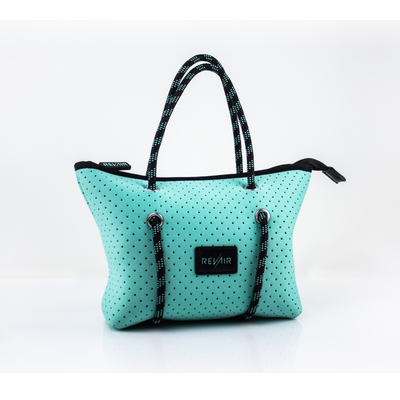
Fuel Your Fabulous: Preventing Breakage and Split Ends

Nothing ruins a style faster than split ends! Whether you have curls, waves, coils, or pin straight locks, every glam goddess can relate to feeling lackluster when our hair isn't at its best. We all deserve that fresh out of the salon glow when it comes to our hair. So what's the secret to preventing breakage and always loving your locks?
Hair love starts with self-love.
There's never been a better time to honor your hair by caring for your gorgeous locks with patience, respect, and a little gentle TLC to prevent split ends and breakage. No one enjoys running damage control as part of your morning routine. Unfortunately, most glam goddesses are so used to "fixing" their hair after split ends and breakage have occurred. Natural hair is our passion, and we're adamant that no quick fix is needed to achieve your dream hair. Nourishing your lovely locks is a healthy hair habit that shouldn't be solely reserved for days when you're dealing with frizz.
Let's start celebrating our hair every day of the week and enjoy fewer split ends along the way. Welcome to the natural hair journey with RevAir.
Maximize Moisture
Contrary to popular belief, split ends don't happen overnight. Frizz and fraying isn't simply the product of a few vengeful hairs on your head; it's a chemical reaction that occurs within the hair shaft. Split end result from hair fibers being stripped from their protective cuticle. The cuticle acts as a kind of shield between your hair's most vulnerable structures and the outside world. Over time, factors such as chemical processing, frequent heat treatment, dry air, and seasonal changes can disrupt the healthy makeup of each strand. This eventually leads to breakage and thinning or hair loss.
Split ends are most problematic for dry and brittle hair. While no hair type is safe from split ends, certain hair types are more prone to breakage. A 2015 study found that type 4 hair (thicker in texture and more of a coily curl pattern) is especially prone to damage due to the location of the oval-shaped hair shafts. Fine-textured hair may be less prone to split ends; however, this hair is often the most fragile when it comes to thinning and hair loss once split ends occur.
The key to combating this issue without splitting hairs over which styling remedy to use is providing your hair with the hydration it needs to flourish.
Establish a moisturizing routine for your hair. Focus on incorporating hydrating ingredients, especially butter and oils, that enrich and restore your hair's natural elasticity. Honey, aloe, vitamin B5 complex, argan oil, and primrose are just a few of our favorite moisture products for natural hair to keep on hand. Incorporate a restorative mask treatment at least twice a week and indulge your hair in a complete deep conditioning treatment monthly.
Seal Your Ends
Now that you've established a tremendous moisturizing routine for your hair, it's time to add the finishing touch. Protect your hair by sealing the ends. Sealant products for natural hair come in the form of butter and oils. These rich, nutrient-dense ingredients prevent split ends by forming a shield around the cuticle. Shea butter, coconut oil, argan, Jamaican black castor oil, primrose, and Muru Muru butter are excellent options to apply to dry hair at the end of your shower routine.
Suppose you switch up your hair care routine seasonally (recommended). In that case, it's a good idea to seal your hair frequently during the winter months. The air is dry, and low humidity means more frizz and split ends. Fighting nature with nature is the best way to keep your hair bouncy, soft, nourished, and vibrant year-round.
Be Gentle
We all have days when we want to tear our hair out. Don't take your frustration out with a hairbrush quite yet. We want to empower our natural hair community to give their hair the time, patience, and nurturing it deserves.
If you have fine and delicate hair of Type 1 or Type 2 variety, you may notice loose strands frequently left behind in the comb. Likewise, curly and coily hair that falls into Type 3 or Type 4 categories is often the victim of tugging, pulling, and yanking during the detangling process. Resolve to stress less by taking a little extra time to work through any knots and tangles with your fingers before showering. Once you've gotten your hair wet, work through any remaining snares with a wet brush designed with your hair type in mind. Use a high-quality detangling spray and apply the slip to each section liberally. This process takes time! Put on a good show, relax with your favorite snacks or beverages, and get the detangling party started.
As a follow-up, be sure to let your hair breathe by embracing looser styles at the gym and keeping no-frizz elastics on hand.
Try a Protein Treatment
Degradation of the protein bonds in each strand of hair is another factor in creating split ends. While we often make the mistake of trying to correct the problem after the fact, strengthening our hair to prevent split ends is a much more effective strategy. Hair and nails are made up of keratin protein bonds. These intricate bonds hold it all together and create smoothness and shine.
Salon quality protein treatments are like a protein shake for your hair. Just as shakes restore and support our muscles, protein treatments strengthen our lovely locks to prevent breakage and split ends. The best protein treatments for natural hair include keratin treatments that range from basic keratin treatments to KCMAX and Keratherapy, as well as Olaplex treatments that work to restore the hair's cellular structure. The latter is an excellent option for hair that is frequently color-treated or chemically processed. At the same time, keratin is a perfect all-around choice for all hair types and textures.
Don't Neglect Routine Trims
Once the hair's cuticle has worn down, there's no reviving a split end. However, frequent trims are ideal for getting rid of unhealthy strands and making room for new growth.
If you're trying to grow or stretch your natural hair, you may be a bit trim shy. The age-old myth that you shouldn't cut your hair -- not even a little -- when growing it out is one of the biggest hair care hoaxes that we'd like to debunk. Regular visits to the salon keep your hair healthy while providing you with a relaxing self-care moment. Think of scheduling styling visits as investing time in yourself. This is your moment of peace and a space where creativity can flourish.
There's no need to go for a dramatic chop to maintain healthy hair. Try adding layers, trimming any rough edges, changing out hair extensions or protect styles, and taking the opportunity to give your hair a fresh new look. If you like to play around with colors, time your trim appointment with a color refresh or deep conditioning treatment between coloring sessions. Avoid vertical cuts as these tend to breed more frizz and flyways. Find a stylist who is well versed in your hair type, and don't be afraid to ask for their input on fighting frizz while growing out your hair.

Dry, Don't Fry
Heat is your hair's number one enemy when it comes to fueling your flawless. When we dry or heat style our hair, we're stripping away the cuticle and breaking down protein bonds that keep our hair smooth, sleek, and radiant. Heat styling adds stress to your hair by increasing the everyday exposure to heat and wind. This, in turn, causes split ends and breakage.
If you've noticed a pile of hair on the bathroom floor after blow drying, it's time to quit frying and start nurturing your unique locks. Join the styling revolution that has so many natural hair beauties saying goodbyes to their old-school hairdryers. Reverse-Air technology is a hair drying alternative that circulates air naturally to gently dry, stretch, and straighten without the need for high heat. Best of all, this innovative technology is designed with all hair types in mind. RevAir was developed with wellness for all as the guiding principle behind a healthier hair care method.
Whether your hair is ultra-fine or ultra curly, glam goddesses everywhere can enjoy spending less time torturing their hair and more time enjoying flawless locks free of split ends and frizz.
Loving your hair is one of the best ways to practice self-care and wellness from the comfort of home. There's no need to cover up flaws. Your natural hair is simply radiant without heavy products weighing down your style. Prevent split ends and honor your unique beauty through a healthy hair regimen. Well-loved hair shows! Flaunt your glow up and say goodbyes to frizz for good.
Looking for more innovative natural hair techniques? Contact our team to discover the perfect routine for your hair type and texture.

















